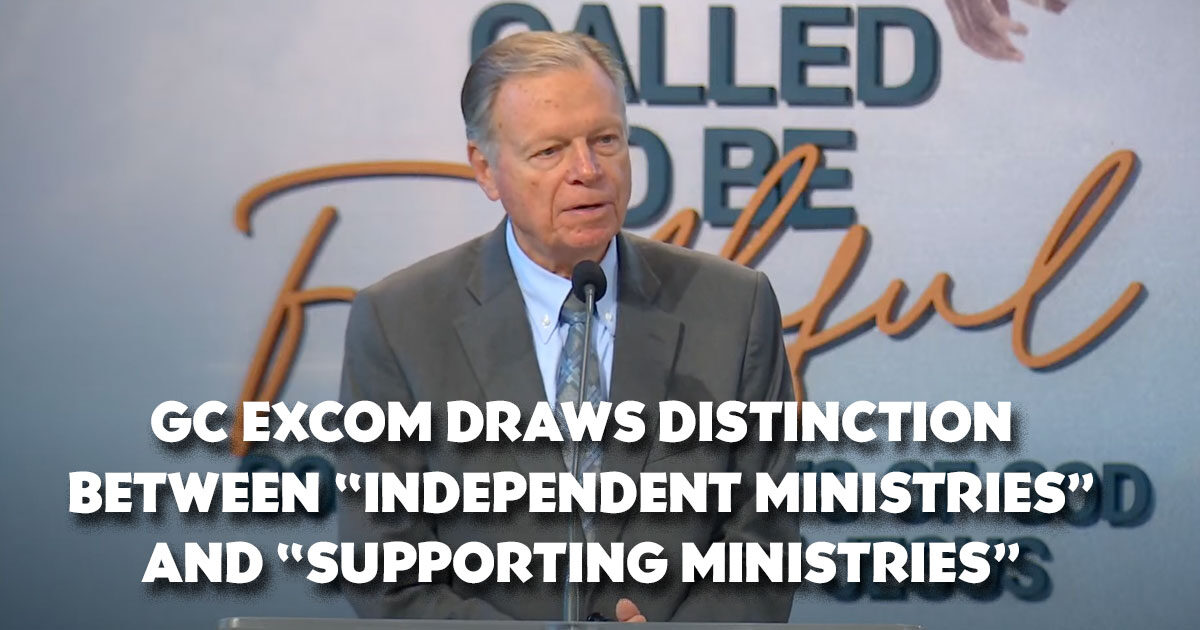GC Excom: Independent Ministries Aren’t Necessarily Supporting Ministries
11 April 2025 |
At the General Conference Executive Committee (GC Excom) meeting this past week, Mark Finley led an extended discussion into the difference between independent ministries and supportive ministries—a discussion that helps establish the way the church organization views organizations like Adventist Today. He began by pointing out that the first self-supporting missionary was the apostle Paul. Said Finley,
“The basic message of 1 Corinthians 12 is the unity of the body of Christ, with each member working together in a common mission in a common commitment to a common message.… Paul did not require from the corporate church finances, but he was committed to message and mission, and he made tents there with Aquila and Priscilla, so we have the very basis—the very foundation—for supporting ministries there in scripture.”
He traces the beginning of supporting ministries to ASI (Adventist Laymen’s Services & Industries)
“in 1904 when Madison College was established by Percy McGann… it was a training school to train self-supporting missionaries. As that school developed there were health institutions, small sanitariums, educational institutions, health food restaurants, and by 1947 that network had so expanded that the General Conference in the North American Division started what was called ASI.”
One of the requirements of membership in ASI is that they
“would cooperate with mission. They did not think they were corrective to their perceived view of the follies of the church, of the apostasy of the church…. They have a passion to support the church. They are not critical of the church—as opposed to some independent ministries who think their major mission is to correct the church—that’s not ASI; that’s not OCI (Outpost Centers International).”
The distinction between those who are fully supportive of the church, versus those who might have criticisms of the church, was underlined by OCI president Steve Dickman.
“These ministries have to covenant to work in support of the mission as well as the doctrines of the Seventh-day Adventist Church…. I think ‘supporting ministry’ is the right term, and when I hear the term ‘independent ministry’ it just kinda makes me feel a little bit like these people are not with us. They’re not doing the same thing we are. They’re independent in nature, and when I see that, I see characteristics of people or ministries who are critical of the church, who may have even accepted into their governing structure people who are not Seventh-day Adventists, and maybe they’re even accepting tithe, and so those things would be adverse to the work of working together.”
ASI North America president Andi Hunsaker made the same point.
“One of the asks that we have of anybody that joins ASI is that they are truly supportive of the message, the mission, and the leadership. You will not find, I don’t think, anyone in ASI criticizing the leadership that we believe God ordained. And I want to just say to Elder Wilson, thank you so much for your leadership over the last several years.… Our message is sharing Christ in the marketplace and that’s what we focus on.”
The terms “supporting ministries” and “self-supporting ministries” seemed to be used interchangeably; a major point made by all involved in the discussion is the importance of none of these ministries accepting tithe funds, which each emphasized must be directed to the several levels of the church bureaucracy.




